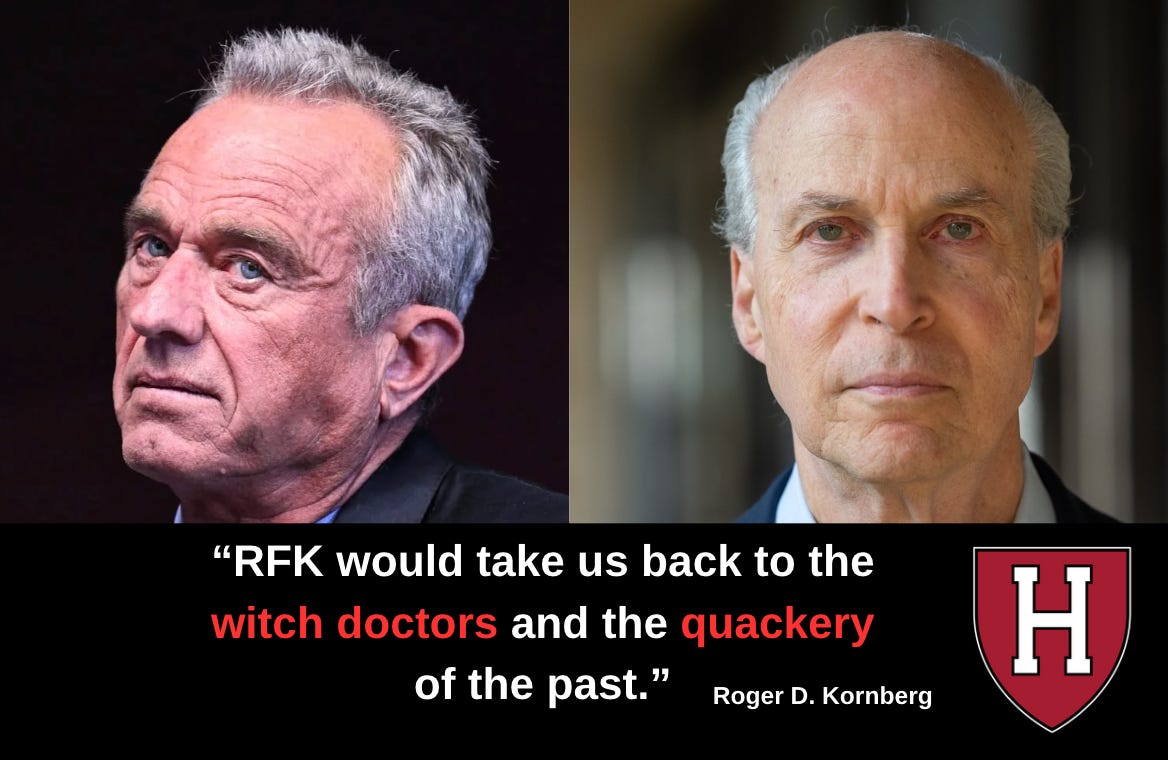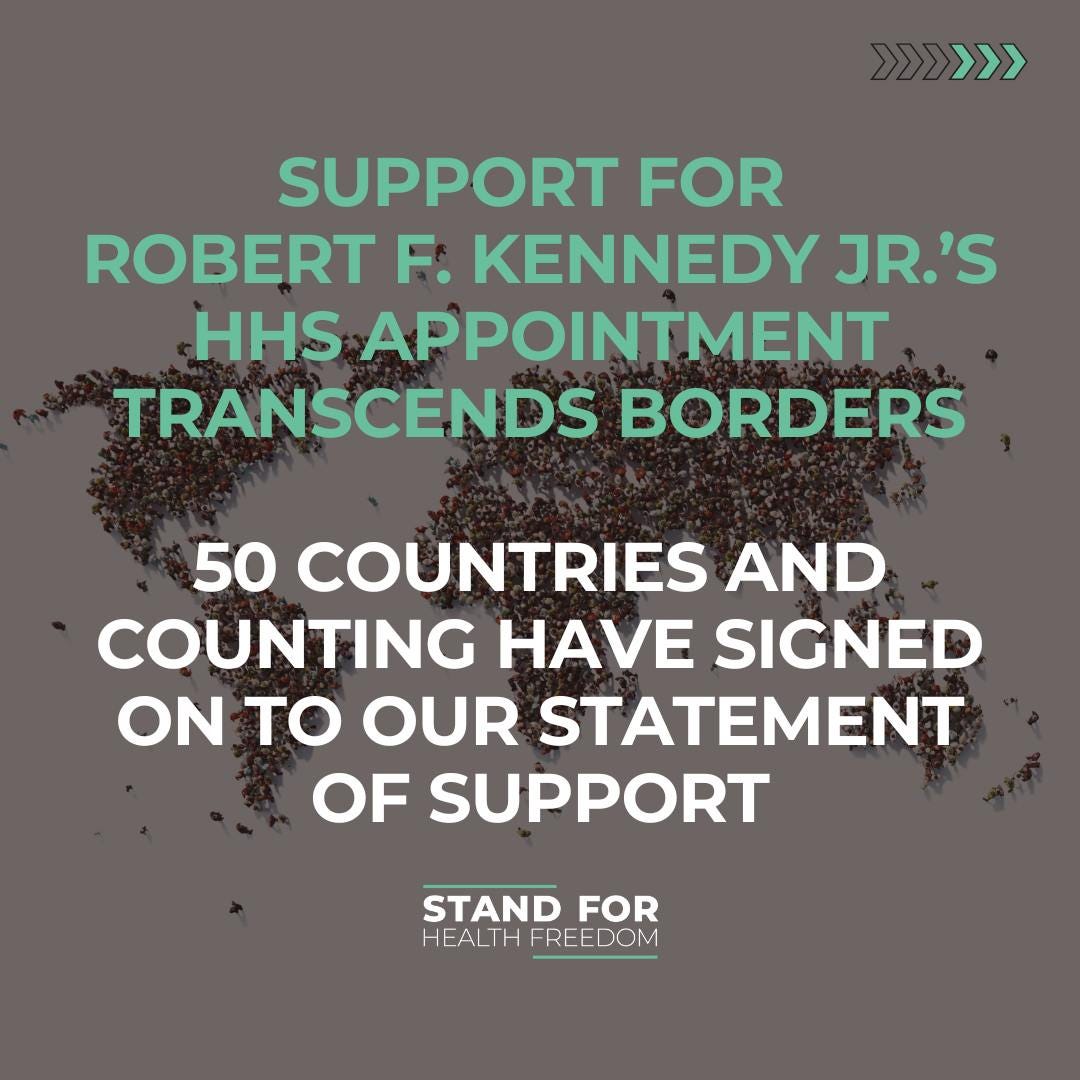The Harvard Elite’s Witch Hunt: Smearing RFK Jr. While Protecting Big Pharma Interests
The real 'witch doctors' aren’t who you think—they’re the elites weaponizing public health to protect Big Pharma’s profits.
In a stunning display of elitist overreach, 15 Harvard-affiliated Nobel Laureates, already part of a larger group of 77 laureates, voiced their opposition to Robert F. Kennedy Jr.’s nomination for Health Secretary. Their attacks culminate in a particularly hyperbolic statement from Roger D. Kornberg, a 2007 chemistry laureate, who described Kennedy’s leadership as a return to “witch doctors and quackery” and even called him “the gravest threat to public health, going beyond even a pandemic to the ravages of disease.”
While these words aim to smear Kennedy, they expose a deeper truth: the entrenched power structures Kornberg and his peers represent are not about protecting public health but preserving their influence. Kornberg’s own extensive ties to the pharmaceutical and biotech industries reveal glaring conflicts of interest that cast doubt on the objectivity of his critique.
🔗 For details on the origin of the smear campaign, read my previous article on the 77 Nobel Laureates' letter: What the Nobel Laureates Aren’t Saying.
Roger Kornberg’s Big Pharma Ties
Kornberg’s condemnation of RFK Jr. demands scrutiny in light of his significant ties to the pharmaceutical and biotech sectors. His professional roles include:
Cocrystal Pharma, Inc.
Role: Chairman of the Board and Chief Scientist; Co-founder.
Focus: Development of antiviral drugs, including for COVID-19.
Conflict: Direct financial and professional incentives in pharmaceutical ventures create bias when opposing Kennedy’s calls for accountability in drug safety.
Teva Pharmaceuticals
Role: Advisor.
Focus: A global pharmaceutical giant producing generics and proprietary drugs.
Conflict: An advisory role at a major pharma company inherently aligns Kornberg with industry interests, undermining impartiality.
Tissue Dynamics
Role: Advisory Board Member.
Focus: AI/ML-driven drug development.
Conflict: Involvement in pharmaceutical innovation creates vested interests in regulatory policies that favor drug development pipelines.
Pacific Biosciences
Role: Advisory Board Member.
Focus: Genetic sequencing and biotech applications.
Conflict: Alignment with biotech initiatives that intersect with pharmaceutical interests.
These ties highlight Kornberg’s deep entanglement with the very industries RFK Jr. has criticized for prioritizing profits over public health.
The Etymology of "Pharmacy": An Ironic Twist
The irony in Kornberg's "witch doctor" accusation becomes even more striking when we examine the historical roots of pharmaceutical terminology. The very word "pharmacy" derives from the ancient Greek "pharmakeia" (φαρμακεία), which carried multiple meanings:
"The use of any kind of drugs, potions, or spells"
"Use of enchantments, practice of sorcery"
"Poisoner, sorcerer, magician"
This etymology reveals a telling paradox: while Harvard's elites attempt to paint Kennedy as a "witch doctor," they seem unaware that their own pharmaceutical terminology carries these exact historical associations with sorcery and potions. The ancient Greek "pharmakon" itself meant "enchanted potion" or "charm spell"—making their witch hunt against medical dissenters not just politically motivated, but linguistically ironic.
This historical context adds another layer to the current debate: those quick to dismiss alternative viewpoints as "quackery" (another term whose origins are part of a critique against allopathic medical interventions) might benefit from examining their own institutional roots. The transformation of "pharmakeia" from its origins in potions and spells to modern pharmaceutical medicine mirrors a broader pattern of established interests attempting to monopolize the definition of legitimate medical practice.
Fluoridation: The Unspoken Hypocrisy
Kornberg’s attack also underscores the hypocrisy of the public health establishment’s stance on coercive policies. Beyond mRNA vaccine mandates, the elites backing Kornberg continue to promote fluoridation—a policy that mirrors the same ethical violations RFK Jr. has called out.
The most commonly used fluoridating agent, hydrofluorosilicic acid (HFS), is an industrial byproduct classified as a hazardous waste, riddled with contaminants like:
Lead and arsenic, known neurotoxins.
Radioactive isotopes, posing additional health risks.
While touted as a public health triumph, fluoridation has been linked to neurological harm, reduced IQ in children, and thyroid dysfunction. Like mRNA vaccine mandates, fluoridation represents a coercive public health policy that violates informed consent on a massive scale. View the research on over 130 signals of harm linked to fluoride exposure here.
This disregard for informed consent is glaringly evident in Harvard University’s recent decision to mandate five COVID-19 boosters as a condition for in-person education. The policy exemplifies the institutionalization of coercion under the guise of public health protection
Nobel Laureates and Gain-of-Function Controversy: The Real Agenda Behind the Smear Campaign
Forty-nine Nobel laureates who defended Peter Daszak’s gain-of-function research—funded under Fauci’s NIH 🧬—have now openly opposed RFK Jr.’s nomination to lead HHS. This coordinated effort raises glaring questions about the motivations behind their letter. These same grants, linked to manipulating viruses to increase infectivity and lethality, epitomize the dangerous entanglement of science, profit, and unchecked power.
At the center of this controversy lies the career of Dr. Anthony Fauci, whose leadership at NIH coincided with the channeling of taxpayer funds into controversial projects like the EcoHealth Alliance's work on gain-of-function research. The public outcry against these practices gained momentum after RFK Jr.’s bombshell exposé, The Real Anthony Fauci, which laid bare a litany of ethical violations, conflicts of interest, and failures to safeguard public health.
Adding fuel to the fire are rumors of a preemptive pardon for Fauci, reportedly under consideration by the White House. Such a move would further shield key players in this web of influence from accountability. Learn more here.
Source: Google sheet of Laureates
The Real Motivation Behind the Nobel Laureates’ Letter
Why would nearly 50 Nobel laureates take the extraordinary step of opposing a single public servant’s nomination? The answer becomes clear when you connect the dots:
Protection of Personal and Institutional Reputations: Many of these laureates have directly or indirectly benefited from the same grant systems that funded Fauci-backed initiatives. By opposing RFK Jr., they deflect scrutiny away from their own potential entanglements.
Preservation of the Gain-of-Function Paradigm: RFK Jr.’s nomination threatens to pull back the curtain on a scientific establishment that prioritized profit and power over public safety. Gain-of-function research is emblematic of this—research that has not only failed to prevent pandemics but arguably may have caused them.
A Coordinated Campaign to Suppress Accountability: The laureates’ letter is not just a critique; it’s a preemptive strike to prevent RFK Jr. from holding those responsible for public health failures accountable. This includes Fauci, Daszak, and others who facilitated or turned a blind eye to the dangers of their projects.
Preemptive Pardon: Shielding the Guilty?
The possibility of a preemptive pardon for Fauci adds a new layer of urgency to this discussion. Such a move would not only prevent legal accountability for Fauci’s role in funding and overseeing gain-of-function research but would also send a chilling signal to the scientific and medical community: the most powerful players are untouchable.
This potential pardon coincides with growing calls to investigate Fauci and other key figures for their roles in enabling dangerous experiments. These investigations could also reveal whether these experiments had any link to the global pandemic—an outcome that RFK Jr. has vocally demanded accountability for.
Do You See Now Why They Wrote This Letter?
The coordinated opposition to RFK Jr.’s nomination is not about his qualifications—it’s about his threat to an entrenched system of power and influence. By calling out the conflicts of interest that underpin institutions like the NIH and exposing the dark underbelly of gain-of-function research, RFK Jr. represents a seismic shift in public health governance.
The Nobel laureates’ letter is an act of self-preservation, a desperate attempt to shield their legacies and the systems that have benefited them from a reckoning that grows louder every day.
This is not a battle over public health—it is a battle for truth, accountability, and the restoration of integrity in science and medicine.
The Global Backlash Against Smear Campaigns
Despite the attacks, RFK Jr.’s nomination has garnered support from over 70 countries, with international voices recognizing his commitment to informed consent, public health transparency, and ethical reform. This growing global endorsement highlights the desperation of his detractors, who rely on fear-mongering and hyperbole to protect their failing systems.
RFK Jr.’s advocacy threatens the entrenched power of the pharmaceutical-industrial complex, which Kornberg and his peers represent. Their smear campaign isn’t about Kennedy’s qualifications—it’s about maintaining their monopoly on influence.
What This Fight Really Represents
This battle over RFK Jr.’s nomination isn’t just a personal attack—it’s a pivotal moment for the future of public health. The same elites who accuse Kennedy of being a “witch doctor” are those who:
Championed coercive vaccine mandates with insufficient long-term safety data.
Suppressed dissent through censorship and ad hominem attacks.
Backed ethically and scientifically questionable policies like mass fluoridation.
Kennedy represents a chance to restore integrity, accountability, and trust in public health—values his critics seem more interested in undermining.
Call to Action
It’s time to expose the real "witch doctors"—those who have weaponized public health for profit and power. Here’s how you can help:
Share this article to counter the narrative being pushed by Big Pharma-aligned elites.
Contact your representatives and demand they support RFK Jr.’s nomination here.
Join the global movement for informed consent, ethical transparency, and public health reform.
View and share the X thread on this topic here.
RFK Jr. isn’t the threat—he’s the solution to a system that has failed the people it claims to serve.
🔗 For more details on the origins of this smear campaign, read: What the Nobel Laureates Aren’t Saying.
#InformedConsent #RFKJr #PublicHealthReform #BigPharmaConflicts










And then there is this:
In the Liddell and Scott New Edition (Oxford 1940) of their, A Greek-English Lexicon, they note:
Pharmakeia – “the use of any kind of drugs, potions, or spells”, “use enchantments, practice sorcery”.
Pharmakon – “enchanted potion, philter: hence, charm, spell”
Pharmakos – “poisoner, sorcerer, magician”. These entries were all found on page 1917 of Liddell and Scott.
And this is from Thayer’s Greek-English Lexicon of the New Testament, 4th Edition:
Pharmakeia, “the use or administering of drugs . . . poisoning . . . sorcery, magical arts”.
Pharmakeus, “one who prepares or uses magical remedies”
Pharmakos, “pertaining to magical arts”.
thank you ,for this article ,it's very good .